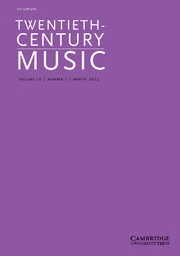
Twentieth-Century Music
Scope & Guideline
Illuminating the Intersections of Music and Culture.
Introduction
Aims and Scopes
- Interdisciplinary Analysis of Music:
The journal emphasizes the importance of interdisciplinary approaches, examining how music interacts with other fields such as politics, sociology, and cultural studies. This broad lens allows for a deeper understanding of music's role in society. - Focus on Global Perspectives:
Recognizing the global nature of music, the journal encourages studies that highlight non-Western music traditions and their interactions with Western practices, promoting a more inclusive understanding of musical modernism. - Historical Contextualization:
A significant portion of the journal's articles are dedicated to placing musical works in their historical contexts, examining how historical events and cultural shifts influence musical expression and reception. - Critical Engagement with Contemporary Issues:
The journal actively addresses contemporary themes such as digital culture, identity politics, and social justice within music, reflecting on how these issues shape musical practices and experiences. - Exploration of Music as a Cultural Artifact:
By treating music as a cultural artifact, the journal delves into its significance as a means of communication, identity formation, and historical memory, thus enriching the discourse surrounding music's societal impact.
Trending and Emerging
- Digital and Online Music Cultures:
With the rise of digital media, there is a growing interest in how online platforms shape musical experiences, identity, and community engagement, reflecting the significant impact of technology on music consumption. - Music and Social Justice:
An increasing number of articles focus on the relationship between music and social justice movements, exploring how music serves as a tool for activism and a means of addressing societal inequalities. - Decolonization of Music Studies:
Emerging discussions around the decolonization of music studies highlight the importance of recognizing and valuing diverse musical traditions and perspectives, challenging traditional Western-centric frameworks in music scholarship. - Intersections of Music and Environmental Studies:
There is a notable trend towards exploring the connections between music and environmental issues, including how sound and music can reflect or respond to ecological concerns, thereby expanding the scope of music's cultural relevance. - Musical Memory and Trauma:
Recent publications increasingly address how music functions as a medium for memory and trauma, particularly in contexts of conflict and displacement, emphasizing the psychological and social dimensions of musical experience.
Declining or Waning
- Traditional Classical Music Analysis:
There has been a noticeable decrease in articles focused solely on traditional classical music analysis, suggesting a shift towards broader cultural contexts and interdisciplinary approaches rather than isolated musicological studies. - Eurocentric Music Histories:
The journal has seen a waning emphasis on Eurocentric narratives in music history, as the focus increasingly shifts towards global perspectives and the inclusion of diverse musical traditions. - Strict Genre Boundaries:
The exploration of strict genre boundaries appears to be declining, with a growing interest in hybrid forms and cross-genre influences, reflecting a more fluid understanding of musical categorization. - Biographical Studies of Composers:
While biographical studies have been a staple in music scholarship, there is a decrease in articles dedicated solely to composer biographies, indicating a preference for thematic and contextual analyses over individual narratives. - Focus on Performance Practice:
Research centered exclusively on performance practice seems to be diminishing, as scholars increasingly integrate performance within broader cultural and social frameworks rather than treating it as a standalone subject.
Similar Journals
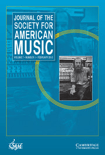
Journal of the Society for American Music
Unveiling the Diversity of American Musical TraditionsThe Journal of the Society for American Music is a leading academic journal dedicated to the study of American music and its diverse cultural contexts. Published by Cambridge University Press, this journal serves as a vital platform for researchers and professionals in the fields of musicology, ethnomusicology, and American studies, contributing significantly to scholarly discourse and advancing knowledge in these areas. With an impressive impact factor reflecting its academic rigor, it is placed in Q2 of the music category as of 2023 and ranks #55 out of 180 in the Arts and Humanities segment, placing it in the 69th percentile among its peers. Since its inception, the journal has published a wealth of articles, reviews, and critical studies that explore the rich tapestry of American musical traditions from historical and contemporary perspectives. It operates under a subscription model, ensuring a wide distribution and accessibility to its important findings. Researchers, students, and professionals alike will find the journal an essential resource for advancing their understanding of the dynamic landscape of American music.

Musicologica Brunensia
Innovating the Future of Music ScholarshipMusicologica Brunensia, an esteemed journal published by Masaryk University, Faculty of Arts, serves as a significant platform for the dissemination of knowledge in the field of musicology. Based in the Czech Republic, this Open Access journal has been facilitating scholarly communication since 2009, allowing unrestricted access to its rich array of research articles. With an ISSN of 1212-0391 and an E-ISSN of 2336-436X, Musicologica Brunensia proudly holds a Q3 ranking in the Music category as of 2023, reflecting its dedication to advancing research in the arts and humanities, particularly music. The journal accepts contributions spanning diverse topics within music studies, fostering interdisciplinary dialogue among researchers, professionals, and students alike. Located at Arne Novaka 1, Brno, 60200, Czech Republic, Musicologica Brunensia is poised to continue its journey of promoting innovative scholarship in musicology until 2024 and beyond, making it a valuable resource for anyone passionate about the field.

LIED UND POPULARE KULTUR-SONG AND POPULAR CULTURE
Bridging the Gap Between Sound and CultureLIED UND POPULARE KULTUR-SONG AND POPULAR CULTURE, published by WAXMANN VERLAG GMBH, is a unique interdisciplinary journal that delves into the rich interconnections between song and popular culture, facilitating discourse among researchers, professionals, and students interested in cultural studies and musicology. With ISSN 1619-0548, this prestigious journal serves as a crucial platform for scholarly analysis, critical reviews, and innovative research exploring various facets of popular music and cultural expressions in Germany and beyond. Although classified in the 2023 Scopus category quartiles as Q4 in both Cultural Studies and Music, the journal maintains an essential role in fostering engagement and reflection on evolving cultural practices. Although it is not available as Open Access, articles from the journal have previously contributed valuable insights and shaped the conversation on popular culture from its inception in 2002 to its recent issues in 2023. Researchers will find this journal particularly relevant for its focus on underrepresented voices and themes within the cultural landscape.

MUSICAL TIMES
Illuminating the Intersection of Music and SocietyMUSICAL TIMES is a distinguished journal dedicated to the exploration and dissemination of scholarly works in the realm of music, serving as an essential resource for researchers, professionals, and students alike. Published by MUSICAL TIMES PUBLICATIONS LTD, this journal has built a robust reputation within the arts and humanities, specifically focusing on music studies, with an impactful reach indicated by its Scopus ranking at #73 out of 106 in the field. Though access to this journal is not open, its curated content, which spans various facets of musicology and contemporary music discourse, enriches the academic community by encouraging insightful discussions and critical analyses. With its historical roots tracing back to its inception, MUSICAL TIMES aims to foster a deeper understanding of music's cultural, social, and artistic dimensions, making it a valued publication for those engaged in the scholarly pursuit of music.
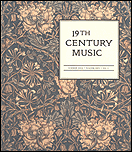
NINETEENTH CENTURY MUSIC
Deciphering Musical Narratives from a Transformative EraNineteenth Century Music is a prestigious journal published by University of California Press that has been a vital contributor to the understanding of musical trends and cultural contexts from the 19th century. With an ISSN of 0148-2076, this journal operates within the Q2 category in Music, ranking 96 out of 180 in the Arts and Humanities, reflecting its significant influence and recognition in the field. Established in 1977, it aims to explore diverse topics ranging from music theory to historical analysis, providing a comprehensive platform for researchers, professionals, and students interested in this rich period of music history. While currently not an open-access journal, it offers an array of subscription options that enhance access to its scholarly content. The journal continues to play a pivotal role in documenting and critiquing the myriad ways in which music intersected with the social and artistic movements of the 19th century, making it essential reading for anyone seeking to delve deeper into the subject.
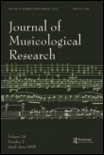
JOURNAL OF MUSICOLOGICAL RESEARCH
Illuminating the Cultural Impacts of MusicJOURNAL OF MUSICOLOGICAL RESEARCH, published by Taylor & Francis Ltd, is an esteemed platform that delves into the field of musicology, contributing to the ongoing dialogue in music research and scholarship since its establishment in 1979. With an ISSN of 0141-1896 and an E-ISSN of 1547-7304, this journal serves as a vital resource for researchers, professionals, and students, offering insights into diverse musicological topics. Although currently categorized in Q4 in Music with Scopus rankings placing it at #110 out of 180 in the Arts and Humanities field, its commitment to excellence and broader discourses in music studies is evident. The journal does not have Open Access options, yet it provides accessible content through reputable academic channels, fostering scholarly exchanges within the community. It aims to publish high-quality research that advances understanding of musical practices and cultural implications, making it a critical resource for those passionate about music and its myriad influences.

ACTA MUSICOLOGICA
Exploring the Depths of MusicologyACTA MUSICOLOGICA, published by the International Musicological Society, stands as a pivotal journal within the field of Musicology, garnering attention from scholars and practitioners alike. With its ISSN 0001-6241, the journal serves as a vital platform for innovative research and discourse from 2002 to 2013 and again from 2016 to 2024, achieving a Q2 ranking in the 2023 Music category. Reflecting a commitment to excellence, it ranks #105 out of 180 in Arts and Humanities Music according to Scopus, placing it at the 41st percentile among its peers. Although not open access, ACTA MUSICOLOGICA ensures the dissemination of significant musical research, fostering scholarly exchange and exploration. This esteemed publication is essential for researchers, professionals, and students looking to deepen their understanding of musicology and contribute to ongoing academic conversations.
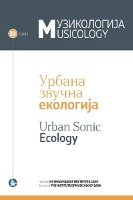
Muzikologija-Musicology
Bridging Cultures Through Academic MelodiesMuzikologija-Musicology, published by the esteemed Serbian Academy of Sciences and Arts, Institute of Musicology (SASA), serves as a pivotal platform for scholarly discourse in the field of musicology. With its ISSN 1450-9814 and E-ISSN 2406-0976, this open-access journal has been committed to disseminating high-quality research since 2002, making significant contributions to the understanding and analysis of music in diverse cultural contexts. Located in Belgrade, Serbia, the journal proudly holds a Q2 ranking in the Music category for 2023, reflecting its high-impact contributions as evidenced by its Scopus rank of #136/180 and a percentile of 24th. Covering a wide array of topics within music, from ethnomusicology to music theory and history, it invites contributions that push the boundaries of music research. By fostering an open-access model, Muzikologija-Musicology aims to ensure that its findings are accessible to a global audience, thereby enriching the discourse and fostering collaboration in the musicology community.

INTERNATIONAL REVIEW OF THE AESTHETICS AND SOCIOLOGY OF MUSIC
Investigating the Social Pulse of Musical ExpressionThe INTERNATIONAL REVIEW OF THE AESTHETICS AND SOCIOLOGY OF MUSIC, published by the Croatian Musicological Society, is a pivotal scholarly journal dedicated to the intricate intersection of music, aesthetics, and sociology. With a special focus on exploring the cultural and social dimensions of music, this journal serves as a platform for researchers, professionals, and students alike to disseminate innovative ideas and transformative research. Although it operates under a traditional access model, the journal's impact within the field of music studies is underscored by its commendable Scopus ranking in the Q3 category and its established history from 2009 to 2016, with a renewed focus from 2018 to 2023. With an ISSN of 0351-5796, it continues to shape academic discourse with its insightful contributions and is essential for those aiming to engage deeply with the evolving dynamics of music in society.

Muzikoloski Zbornik
Exploring the Depths of Musical HeritageMuzikoloski Zbornik is a prominent open-access journal in the field of musicology, published by the esteemed University of Ljubljana Press since 1965. Hailing from Slovenia, this journal has been dedicated to advancing the study of musical heritage, theory, and practice, serving as a vital platform for researchers, professionals, and students alike. With a notable Q2 category ranking in the field of music and a Scopus ranking of 109 out of 180 in Arts and Humanities, Muzikoloski Zbornik showcases high-quality research, fostering discourse and collaboration among scholars globally. The journal embraces a diverse range of topics, from ethnomusicology to music education, ensuring its relevance in an ever-evolving academic landscape. By providing unrestricted access to its content, it champions the dissemination of knowledge and supports the growth of the musicology discipline.